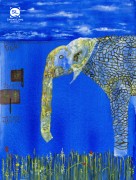I’ve been a little obsessed with your work since discovering you with this piece. It looks to me like “Shallow Water” features some motifs that recur in your poems. Am I right in noticing that birds are a thing for you? What is it about birds that speak to you?
First of all: Wow! Thank you. You know, I didn’t realize the bird motif until my friend and fellow poet Kathy Engel pointed it out recently. I always thought birds were a cliché metaphor, too easy for a writer, so I was disappointed I hadn’t noticed it myself and worked out of the habit. But also, of course birds! They represent freedom, they live both in our grounded world and in the sky, they have feet that look like dinosaurs—they are descendants of dinosaurs! They seem somehow to live in both the past and the future simultaneously and defy time.
It’s clear to me that you’re trying to have a whole different kind of conversation through your writing, and hybrid forms are part of that. What is your approach to form? How do you know what should be what?
Intuition, of course, but also, likely by project. As a teenager I made zines and drew no boundary between multi-genre writing, layout and drawing. As an adult, I still struggle with having work that spans modes of expression—is it allowed? I’m looking back to fifteen-year-old me for inspiration and courage to just make what I want to make. Right now, I’ve been illustrating “Pep Talks For Broke(n) People,” which are tender and sincere pieces of writing that aren’t exactly poems, but not exactly stories or prose. They are often sweet, and I think the drawings aid their delivery. I’ve always felt my drawings were cute to the point of detriment, so that also must influence how I decide to pair with words. I might one day get the guts to experiment with drawing more intense, darker subjects, too. Otherwise: Poems are still my go-to, essays stress me out (but I’m interested in the challenge), and I am very excited to be experimenting with fiction—my first love as a reader—dipping my toe into a genre that frightens and excites me with its possibility and depth.
I see that you have taught writing in prisons. What draws you to those students?
I don’t teach anymore, though through my current full-time job, I work with writers in prison, and writers confronting mass incarceration. All day every day, that’s my focus. Though I would have told you for social justice reasons at the time, I think I was also initially drawn to the experience because it felt extreme and hidden. I knew, logically, that people behind the walls were just people, but I’d been taught my whole life by media and our culture of morality that if you’re in jail, you’re just a bad person. There was intrigue and a challenge and frankly, I was invited to do it and said yes.
Of course, my motivations quickly evolved. Though I went in already very politicized, I saw the broken system up close. I saw human rights violations. I already knew the system grotesquely disproportionally targets boys and men of color, particularly Black and brown men. I felt a heightened state of humanity—negative, of course, but more shockingly, such lucid moments of positive connection, talent, and intelligence that insisted in the face of a brutal environment. I met people who’ve touched my heart very deeply, and heard stories that have rocked me to my core. I understood, on a more embodied level, that this system does not help deter crime, nor support victims, nor help heal the root causes of crime, nor support the individual who has caused harm in making amends or living a different life. It has drawn me into a complex conversation with myself on what it means to be human, and how we reconcile with violence on personal, interpersonal, communal and systemic levels.
Now I’m thinking about how we create literary community through the walls, how we can create space for writers in prison to expansive in identity (and not stigmatized into “prison writer”), and how to use writing as advocacy. I call our work “connective versus charitable.” It’s impossible to keep this answer short, so we must get a coffee sometime and talk more.
This journal has gotten away from its origins a little bit, but its founding purpose was to feature work that was about a smoke, one cigarette’s worth of contemplative silence, long. If you had about that long to think about any subject, what would your mind move to?
I have to say for my mom’s sake that I’m gonna swap this question’s language to coffee break! Truth is, I usually think about myself or something connected to my upset, worries, wants, to-do’s. This answer is so boring that I hope it helps me pause in the future and reroute my thinking towards how incredible it is that there are such a thing as blue whales. Which I do think of quite often. Lately I’ve been amazed by how electrons change their behavior when being observed, wondering how animal communities enact concepts of justice (or if they do at all) and how plants communicate. This is also the content of some of my recent poems—spoiler alert!
Writing really sucks sometimes—like, it literally sucks at one’s energy, spirit, happiness. Is it that way for you, too? I’m wondering if we’re kindred spirits in this way.
Sometimes I find writing a drag, but I have so little time to write that sneaking it in feels extremely pleasurable, especially prose. I never imagined myself to be someone who writes on their phone, but I do, in the notes, whole stories. I edit in there. I write on the train, walking down the street, right before I fall asleep. The Google Drive app makes my whole works-in-progress catalog instantly accessible from anywhere I am, which I’ve never thought about until now, but how incredible! I’m obsessed, really, with writing (and I consider reading part of writing, too), and wish I could do it for much longer stretches at a time. It gives me energy, supports my happiness and makes my spirit feel plugged in and alive. If I had more time to write maybe it would go back to being a chore? But I hope not.



 The core workshop of SmokeLong Fitness is all in writing, so you can take part from anywhere at anytime. We are excited about creating a supportive, consistent and structured environment for flash writers to work on their craft in a community. We are thrilled and proud to say that our workshop participants have won, placed, or been listed in every major flash competition. Community works.
The core workshop of SmokeLong Fitness is all in writing, so you can take part from anywhere at anytime. We are excited about creating a supportive, consistent and structured environment for flash writers to work on their craft in a community. We are thrilled and proud to say that our workshop participants have won, placed, or been listed in every major flash competition. Community works.